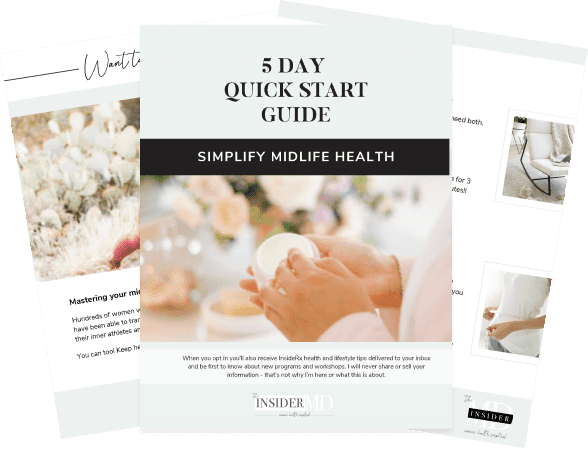
Menopause and Exercise Intolerance: How to Improve Physical Strength and Endurance
During the menopause transition, the estrogen decline can cause metabolic changes resulting in central weight gain that may lead to a decrease in exercise tolerance. It’s an important phenomenon to be aware of, because, for someone with exercise intolerance, getting enough physical activity feels impossible.
Exercise intolerance is being unable to perform physical exercise at the typical level or duration for people of your age. The inability to perform isn’t just because you’re tired or lazy. It’s due to a larger problem, like being significantly de-conditioned, or some other health condition.
But, the good news is, there are things you can do to build up your strength and endurance, even if you’ve been sedentary for a while.
Menopause And Exercise Intolerance
Many menopausal women feel fatigued and exercise is the last thing they want to do. Weight gain, brain fog, and anxiety—which are fairly common symptoms during the menopause transition—can make it harder to find the motivation to hit the gym.
Menopausal women are generally advised to get 150/min/week of moderate-intense physical activity, such as walking, jogging, cycling, or swimming, along with daily household activities. That’s around 20 minutes every day, or 30 minutes, 5 times per week.
Aim For Progressive Physical Activity
Physical activity, such as walking, jogging, or cycling, coupled with household activities, helps to burn calories and improves menopause symptoms like hot flashes and night sweats.
To build your exercise tolerance and see results, your physical activity routine has to be personalized to your needs and progressive, meaning you start slowly and add a little bit to your program every week or so until you have reached your target level. For example, you might start by walking 5 minutes every day at a slow pace. You can slowly pick up the pace every few days and add more minutes every week until you are able to regularly walk briskly, 30 minutes or more per day.
Eventually, aim to add in resistance training 2–3 times/week to help maintain bone and muscle mass.
Recommended Routine For Menopausal Women To Build Exercise Tolerance
Stretching
Our bodies become less flexible with age. Begin any exercise program with warm-up exercises including full body stretches and/or a 10 min walk on the treadmill. Warming up helps prepare your body for exercise.
Resistance And Strength Training
As you’re feeling stronger, add in short bouts of resistance exercise and strength training, every other day, using resistance bands or weights. These exercises help to maintain and build muscle mass and bone density in menopausal women.
Balance Exercises
Balance exercises help maintain good posture and help prevent falls in menopausal women. Good exercises for balance include; standing up from a seated position without using your hands and walking in a line, heel to toe, for a short distance. You can also try pilates or tai chi which have been shown to improve balance and core strength and reduce the incidence of falls.
Cool Down
Finish each exercise session with cooling down exercises such as slow walking for a few minutes and muscle relaxing stretches..
Menopause And Exercise Intolerance Faqs
What Are Symptoms of Exercise Intolerance?
Symptoms of exercise intolerance include severe post-workout pain and soreness, fatigue, nausea and/or vomiting. These symptoms are due to the condition causing the reduced exercise tolerance, not the workout itself.
Does Menopause Affect Athletic Performance?
Women can lose up to 20% of their bone density in the first five to seven years after menopause. Weight-bearing exercise puts stress on bones, which spurs the body to strengthen them. Because women athletes perform regular intense weight-bearing activities (running, walking, tennis, etc.), they start out with denser bones and stronger muscles. Menopause and aging still have an effect, but to a lesser degree, as long as they keep up regular exercise.
Menopause And Exercise Intolerance: Final Thoughts
For menopausal women who experience exercise intolerance, establishing a regular exercise routine that includes stretching, aerobic exercise, resistance, and strength training, with progressive challenges, will build strength and endurance.

MEET DR. ELLEN
My mission is to bring you the most up-to-date, proven medical information, simplified, so you can make confident, educated decisions about your health.
I'M LOOKING FOR...
grab your 5 day
quick start guide



